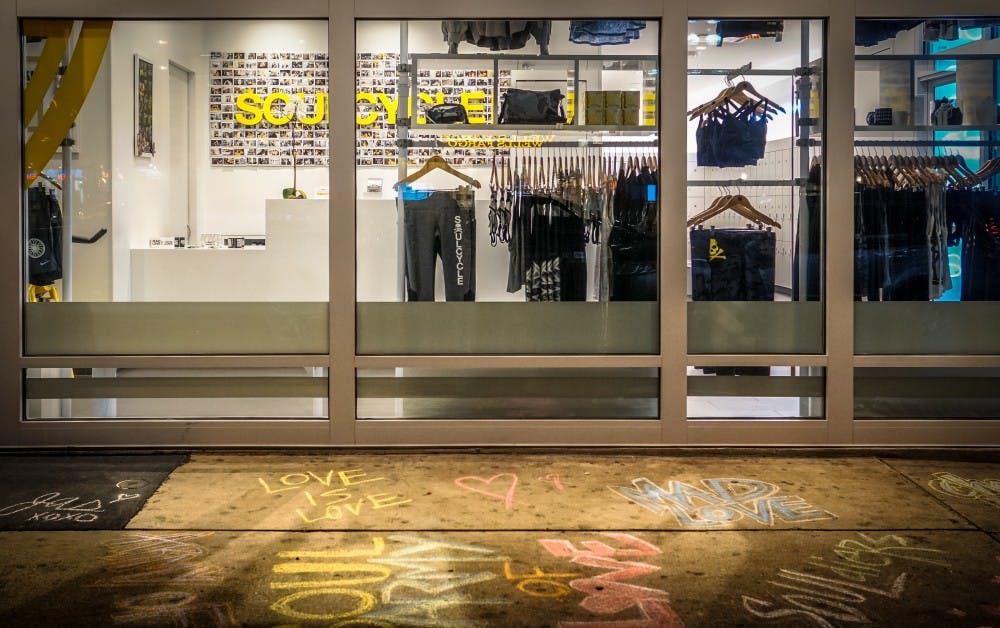At 113 South 16th Street, the name is stated in bold, metallic letters above the heads of the health-conscious Rittenhouse crowds: SOULCYCLE. It’s a call for the unification of mind, body, spirit and stationary bike. There isn't a surface inside the yellow-washed facility that is devoid of an uplifting quote: “Find your soul!” encourages one neon light fixture. The far wall of the studio dubs you “Athlete, Legend, Warrior, Renegade,” and even “Rockstar.” A tank top on the merchandise rack promises your future: “Love At First Ride.” Will it be?
For $30 (excluding the extra $3 for shoe rental, extra $2 for a bottle of Smartwater in case you forgot your own, and the cost of the Uber ride there and back), you can book a bike for a 45 minute cardio blast with any of the well worshipped instructors. There is no student discount, though first-time riders get $10 off their first class. The price is wildly high for a single workout class. But that price is also coughed up, once or twice a week, by a not insignificant portion of the Penn student body.
For some, they swear that the experience, though pricey, is worth their pennies.
“I’m not just paying for a spin class. SoulCycle is like therapy for me,” says one college sophomore. “It doesn’t matter how stressful, dramatic, or terrible my day has been, when I walk into the studio I immediately feel happy and a sense of relief and purpose… I pay $30 for a kickass 45 minute killer workout, therapy for my mind and soul, and a solid period of time to re-center and focus myself and think about my goals. You gotta do what works for you to help your mental and physical health.” Her story is one that’s been told before. For many, SoulCycle is an exercise that helps them to stay both fit and sane, which for them is a responsible and respectable practice.
The studio itself does effectively get these values across in every part of its aesthetic; it’s a near perfect example of lifestyle marketing. The yellow-shirted receptionists beam at you as you initial next to your bike number, and take a polaroid of clients that request it; they hang these on the wall to commemorate the work that the whole community has done. The locker rooms sparkle and the showers are stocked with citrus scented products available to anyone and everyone who takes a class. There are online articles consistently posted to their website about different riders in the community; this week, the featured rider Erin Kessling “Embraced the Army of Love After Heartbreak.” All of the instructors spew words of empowerment throughout the whole class, meditations on topics from self-care, self-love, and self-acceptance to the appreciation of the body as a magic machine and its marriage with the mind. “I will be good to you if you will be good to me,” says one teacher, Yael of this relationship, “Just think about that: I will take care of you if you will take care of me.” It's shocking that the place doesn’t include a matching yellow kitchen and a common room.
But what is most noteworthy about SoulCycle is not what it doesn’t include; instead, it is about who. SoulCycle is socio-economically exclusionary; there is no way to deny that. To go even once a week for one semester, the total cost comes out to roughly $525 if you’re paying single classes, or for the comparable package they offer, of $540 for 20 class. The only possibility of getting around this price is through their college ambassador program, in which different colleges and college groups will be allowed free rides as a marketing tool.
Though this program is not yet implemented in the relatively new Rittenhouse Studio, Laurel Jaffe (C’20) managed to get ahead of the game on this trend and organize free rides for one class to her fellow PennQuest Leaders. “For the PQ ride I talked with the managers at the Rittenhouse studio about PennQuest, it's mission and how similar some of the values of mentorship [and such] are,” She says, “Because the formal ambassador program is not in place yet we could not get a completely free ride but we were able to get 20 free seats in the class.” Hopefully, if this trend continues more events like this might make the exercise classes accessible to many more people. Unfortunately, even those free group rides won’t last sustainably.
Though the leaders as a whole seemed to enjoy the experience, even after a free ride they remained skeptical. “I enjoyed the exercise but I felt like the whole culture surrounding it is way over the top,” says Amos Armony (C’20), “Not worth the price, in my opinion.” He echoes the sentiments of many, and beyond that, gets at the cold hard socioeconomic truth of the business; the price is beyond “not worth it.” The price is in fact, completely unsustainable and exclusionary for anyone who is not extremely privileged.
What’s more, SoulCycle seems to be a magnet for specifically Penn students. One cannot simply attend a class without bumping into a classmate. If one of your snapchat friends goes to the studio, you’re sure to know from their guaranteed mirror-selfie story. So, in a campus culture where flaunting wealth already seems to dominate many social realms, maybe the draw is just that: maybe SoulCycle provides yet another stage that people can use for their performance.

